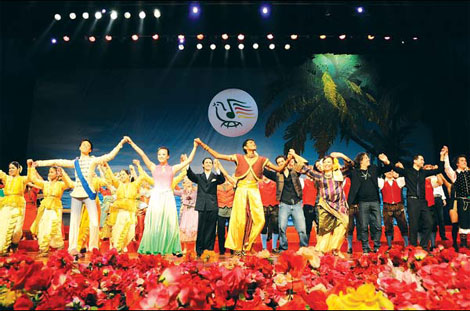Song and art festival takes place in a region that's synonymous with love of folk music
Updated: 2011-10-31 08:03
By Huang Zhaohua and Liu Xiaoqiong (China Daily)
|
|||||||||||
|
Performance at a special evening program for foreign artists at this year's festival. It attracts nearly 150 artistes from various countries and helped give the festival a bigger reputation. Pan Hao / For China Daily |
An annual folk festival in the city of Nanning, in the Guangxi Zhuang autonomous region of China, has been bringing in singers and artists from around the world, over a 13-year span of time, to provide a special mix of ethnic customs, international vision, and a modern style.
The Nanning International Folk Song Art Festival, which has been held since 1999 in the capital of Guangxi, has become one of China's most internationally influential folk song and art events.
It is also a popular place for artists from all over the world to exchange information and compare styles. This year, for example, there was a special program for foreign artists that attracted nearly 150 people from various countries and helped give the festival a bigger reputation, the organizing committee said.
Tong Hui, the head of the Austria-China Economic and Cultural Exchange, said she has led the Austria Art Delegation in taking part in cultural exchanges and performance for three years in a row now, and audiences in Nanning have enjoyed it.
In 2006, festival organizers began working with China's major TV producer, China Central Television, and Austria's national television station to spread the Nanning festival's influence to Europe, while celebrating the 35th anniversary of Sino-Austrian relations.
"Most Austrian artists now know about Nanning, through the festival and look forward to coming to the city to enter the sea of folk songs," Tong added.
She said she believes that the city's exchanges with the outside world could easily extend to the business world. Meanwhile, she hopes to introduce more Austrian artists to Nanning.
Some artists who are part of a folk music group from Klagenfurt, Austria remarked, "We were amazed at Nanning's traditional culture. The festival reflects a superb artistic level and we're glad we came to Nanning, for the cultural exchange."
Most of the artists said they knew very little about the city or its folk songs before arriving, and that its success caused the world to look at the city in a new way.
Kavitba Krisbnan, the creative director of Apsara Asia, a performing arts company from Singapore, had this to say, "We feel honored and happy to have been invited to perform here and I'm impressed by the changes in the city every time we come. Nanning has become more beautiful in recent years, largely due to its efforts to plant more trees and flowers. The people are really friendly as well."
One member of a Cambodian artist group, said, "This is my first time to come here and I feel so glad, the people here are very friendly.
"I've also tried to learn some Chinese because I want to show the passion that I and the people of my country have for China. I hope our performance will impress the audiences here."
Several artists from a New York City ensemble impressed the audiences with their ballet, called Dreaming on Zhuang land, which tells the love story of a foreign boy and a Zhuang girl and combines Chinese and Western musical elements.
Harriett Kinter, director of the program, said the ballet took its inspiration from a Zhuang drawing and was "the first time we've shown it in China. I'm so glad to come here to be in touch with the unique Zhuang culture.
"Nanning is an amazing, energetic city with an incredible charm. I love Nanning. "
Franc, a Slovenian performer who gave his impression, said, "Nanning's really beautiful. And the festival represents a gathering of all of the folk songs in the world. I was particularly struck by many of the traditional Chinese dances. I really hope I can return to the festival next year."
Guangxi is known as the "hometown of the Zhuang people," an ethnic group that is synonymous with a love of the folk music tradition. The region has over 14 million Zhuang people, the highest concentration in China.
(China Daily 10/31/2011 page23)
